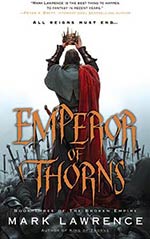
![]() bazhsw
bazhsw
9/25/2025
![]()
I will mention the SPOILER from the setting in this review!
I wasn't sure whether I was going to read 'Emperor of Thorns' having really enjoyed the first book, 'Prince of Thorns' and been a little underwhelmed by 'King of Thorns'. 'Emperor of Thorns' is the conclusion of the 'Broken Empire' trilogy and brings us to a rather satisfying end to the story of Jorg Ancrath. It's one of those books which I felt I enjoyed reading, enjoyed where it took me and quite liked the wider world building and back story / history of the setting but at the same time I felt I didn't love it.
One of the things I really liked about the book was how it expanded the setting and the history of the 'Broken Empire'. I won't get into spoiler territory but if you've read 'Prince of Thorns' then you have probably guessed the setting and if you've read 'King of Thorns' then you definitely know what is going on. In 'Emperor of Thorns' the world is expanded and the world becomes instantly more recognisable. (Here we go for the spoiler....) The Broken Empire is Europe and North Africa thousands of years in the future following climate collapse and weapons of mass destruction unleashed. It is an Earth where society has returned to a medieval level of technology and whilst some remnants of today are present (in old structures, place names, history and culture) it isn't so recognisable. In the series, Lawrence has slowly unveiled more of the setting deliberately at a local, regional and continental level which unfurls the world before us. In 'Prince of Thorns' there are subtle clues before the reveal, in 'King of Thorns' we recognise more but 'Emperor of Thorns' is a future we can more or less now recognise.
This is perhaps the most interesting part of the book and works well with a map of the setting close to hand to understand the journey. The wider plot is an exploration of humanity's relationship to magic, to a technological past and also how forces of the past shape the present. There is also quite a strong transhumanist / artificial intelligence consideration to the book which is quite nuanced.
The overarching plot is Jorg travelling to Vyene (Vienna) to take part in a vote for the Emperor which hasn't been agreed in a century where royalty and their representatives, debate, campaign and influence to try and get an agreement. It never happens but it is something that happens every four years - and of course our upstart king Jorg aims to become Emperor. Interspersed with this are chapters from another character's point of view (Chella the Necromancer who has unfinished business with Jorg) and a perspective of five years earlier as Jorg undertakes a bit of a tour of the Empire looking for revenge and a whole bunch of other things.
The journey to Vyene (with wife and road brothers in tow) is perhaps secondary to his 'five years ago' journey but does serve as a plot device to ever bring us closer to a conclusion and an inevitable reckoning.
The other main takeaway is that Jorg really represents a relentless of a force of nature who will do anything to achieve his goal. It is perhaps an indictment on humanity's almost unstoppable thirst to achieve whilst ignoring the wreckage it leaves behind. Jorg will do literally anything to get what he wants no matter how unreasonable it is, whilst always having a moral justification for his actions. Even in the third book there are parts which still shock even when you think they won't. Jorg as a character is impossible to like, respect or understand but he is interesting and does tell us something about how utterly self-interested we can become and holds a mirror up to achievement culture. Ultimately Jorg's quest to single-handed get what he wants becomes quite obviously a study in what he is running away from and what he must face.
Like a lot about this and how it all came together without feeling that I was reading something particularly special, but I do think if you've read books 1 and 2 this ends it well.